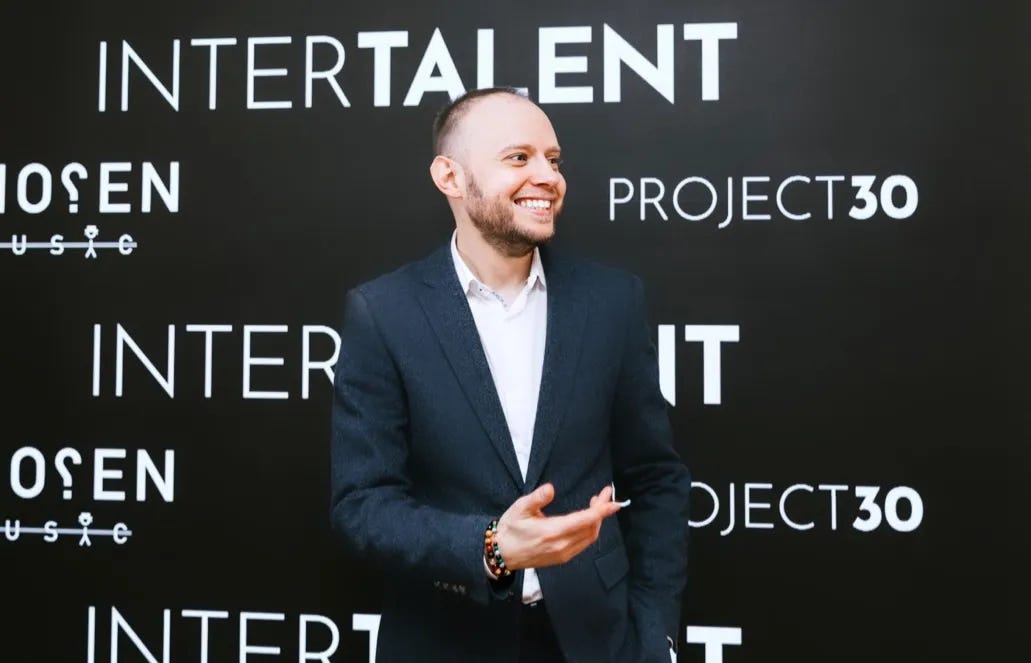Why is owning IP important for both Talent and Agents?
Alex is the Managing Director of major UK talent agency InterTalent. He represents his clients alongside overseeing the agency's creative strategy, day-to-day operations & acquisitions.
Hi! Please share this post with anyone who is interested in the inner workings of a Talent Agent. If you are not already a subscriber, please sign up and join everyone who receives Dealmakers straight to their inbox. It’s free, which is not a word that an Agent uses often.
If you’ve missed my previous blogs about Talent Agents, just head here to catch up.
🤔 Why is owning IP important for both Talent and Agents?
May is always one of the busiest times for events and nights out. As you will know from these blogs, being a talent agent is hard work with long hours, no off button and lots of rejection. So when you get the chance to an event - yes it’s work, it’s networking - but you also have to enjoy it. These are the perks.
In the last month, I’ve been inside Buckingham Palace, hosted a table at the prestigious Variety Club Showbusiness Awards, attended the TV BAFTA Awards at the Royal Festival Hall & Make-A-Wish Foundation’s annual fundraiser at the Savoy and sat on an Agents & Managers panel at Channel 4’s Creating Your Legacy Day. This week I have The Podcast Show and BBC Radio 1’s Big Weekend.
I love networking. It’s one of the best parts of being an Agent. It’s great to see familiar faces and make new friends too. Every event is a chance to grow your contact base and start new conversations. You never know where they might lead. As I mentioned in a previous blog, I never leave unless I’ve given out a certain number of business cards. It’s a little game I play with myself but it forces me to make introductions.
However, the thing I love doing the most is finding out what people are doing, thinking and, most importantly, seeing. What lies ahead? What’s coming around the corner? Where are you focused and why? It helps me not only to navigate InterTalent in the right direction in terms of our ability to attract great opportunities for our clients but the intel is hugely valuable in determining where we focus our energy.
At all these events I’ve been to, as different as they are, I heard the same things coming back at me time and time again given how tough the market is right now in both the Scripted and Unscripted worlds. Forget waiting for others to open doors. Open them yourself. Be entrepreneurial. Own something. Create IP. Intellectual Property. Ownership.
Now, of course, this isn’t new… some of the greatest talent in entertainment have multiple business interests but this year it’s become more important than ever. Having skin in the game should be at the forefront of all our minds.
Today, I’m going to lay out why owning IP important is not only important to Talent but to Agents too.
Let’s go! ⬇️
As we all know, the entertainment industry (specifically in Scripted and Unscripted worlds) is in a problematic situation on both sides of the pond. The slowdown, caused by an ongoing advertising slump and the result of the US writers and actor strikes last year, means that there’s less money to make shows and therefore there is less work. That’s the simple outline of the situation. For talent who are in long-term employment like a daily show or a soap, they are the lucky ones. For those who go from job to job, life in this industry is tougher than ever. Given the rapid changes in viewing habits, the amount of places to find content (TV, Online, Social, Radio, Podcasts and even Blogs…) and that young people are watching YouTube & TikTok far more than terrestrial television, it’s impossible for the traditional worlds to ever return to what it was. It will improve but to what level, it’s uncertain.
Waiting for someone else to provide employment should no longer be the only route for revenue. How do we diversify our offering? How do we not rely on one platform? Now, more than ever, agents have to encourage their talent to be adaptable and forge their own path to create a diversity of income, across multiple genres and platforms. These ventures represent a chance to replace the money both talent and agents are used to from what is now diminishing traditional avenues.
How consumers and brands spend their money has changed immensely but the big money is still there to be spent if the product has a strong audience that is immersed and engaged. There remains great financial excitement for any piece of content (or any talent-led endeavour or business for that matter) that is creatively fresh and thrilling, clearly authentic and can build a big fan base. As I always say, we are in the AUDIENCE and CONTENT business. That doesn’t just apply to superstars like Ryan Reynolds but anyone creative, consistent, focused and passionate. A
For talent, IP can be many things:
✍️ Creating your own formats, building your personal brand through highly engaging and unique content and distributing on your own platforms.
✍️ Launching a production company (in any medium) to not only pitch and create your projects but also give a platform for other people.
✍️ Equity-based brand building which means either building your own product business or investing / co-owning in another.
✍️ Being paid in equity instead of an upfront fee (or a mix of both) for working with a partner, usually a start-up brand that can offer shares in exchange for advertising. You have to be more creative in the deal structure but that’s the fun part.
✍️ There is an alternative to the IP option. If there’s no equity available, the next best option is to negotiate a percentage of the ‘back end’ (profit participation) should the project be sold, licensed or find future income from ancillary opportunities. This is when your talent works on a project which categorically wouldn’t happen without your client being front and centre and their profile is of a level where it’s undeniable that their involvement is integral to the creation and the success.
Talent who have a strong profile have more options. They have the chance to monetise their fame, particularly their social-media followings and invest funds in businesses and projects, use their status to promote their product, launch companies to make their projects and more but the truth is anyone with a great idea can create IP that over time can become very profitable.
So why should Agents also get excited by their clients’ entrepreneurial ventures?
✅ Opportunity: Nothing is better than having a talented client who ticks all of the boxes: entrepreneurial, confident, consistent and a self-starter it just opens so many more doors. You can explore all these avenues and more. Having a client who isn’t just on one path but is on multiple trajectories gives you many more options to pursue. For me, there’s nothing more exciting than working with a multi-faceted client. That’s the kind of client everyone wants.
✅ Participation: Depending on a few factors: the type of venture, the relationship between the talent & agent and the income needed, there are a lot of examples of the agency participating in the IP of the project with the client. That way everyone is super invested in making it a success. There is no set rule on an equity set-up between agency/talent and how to slice that pie, but as long as you get to an agreeable position then to incentivise your agent can be a very smart move for the talent.
✅ Financial: With diminishing opportunities in Entertainment, and therefore an obvious concern that commission for the agency will follow suit, this opens a new revenue stream with your client that can help balance (or even overtake) work that has dried up for that client due to the changing marketplace.
✅ Profile: Having a talent that succeeds in creating something new will either give them a profile or rocket fuel an existing one. In turn, that helps an agent be able to market them to other people - productions, brands etc. It will also uplift the profile of the agent who is seen to represent an exciting talent.
✅ Fun: I’m the kind of agent who loves exploring new worlds and the idea of having a talent who heads away from a traditional path into a more cutting-edge world can only be really exciting. It’s always fun to be involved in a project from the get-go and be hugely involved not only in its formation but also ultimate success. The direct-to-consumer approach has transformed the lives of many talent who have never been on TV, radio or stage and it’s great to be involved in something new.
Of course, there are also pitfalls. Here are the risks:
🤔 While distribution is more decentralised than ever, with infinite ways to now pursue an audience, that also means there are more people than ever doing it. It’s still a fight for attention. Just because there are more options doesn’t mean finding an audience is easier. You need to be more creative and authentic than ever before.
🤔 Lack of consistency is the biggest reason for failure. When you work for another company and you know the paycheck is coming, not a problem. Doing it for yourself, with no knowledge of the result means that most people lose interest. Consistency is one of the biggest hurdles.
🤔 Be willing to take a risk. Investing either your own money or someone else’s is risky business. When I talk to one of our talents about starting a venture I am constantly asking them the big questions. What’s the market we want to get into? What are the ways into it? What is the authentic connection to that idea? Is everyone willing to do the work? Can we see a clear audience? It won’t feel like so much of a risk if every nuance is picked apart at the start.
However, if you have the ability and courage to embrace the knowledge that there is no barriers to entry in 2024… it makes no sense to not put some power in your own hands.
➡️ To recap, these are the 3 key takeaways as to why it’s important to now be entrepreneurial in the entertainment industry:
Creative Control: No one is giving you parameters or regulations, you get to be the maker of your own destiny. Ownership grants you exclusive rights to use, produce and distribute.
Economic Benefits: When you land on the right project that pops, and with real consistency, it can be an incredible source of revenue. You can then monetise and create wealth through licensing agreements, selling rights, advertising and more.
Strategic Partnerships: Creating something that is wanted and fills a gap in the market can facilitate collaborations. Talent with valuable IP can engage in joint ventures or partnerships, leveraging their brand to access bigger opportunities.
📥 I would love to hear from you. Any ideas, thoughts and feedback via alex@intertalentgroup.com are always most welcome.
Please subscribe if you don’t already and tell your friends.
See you next time.
Alex



